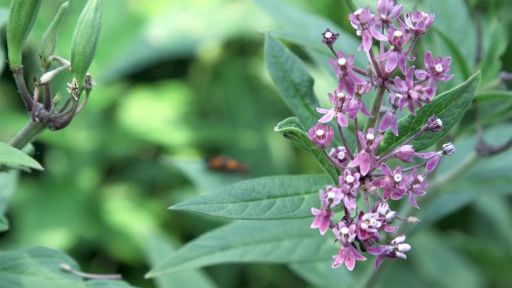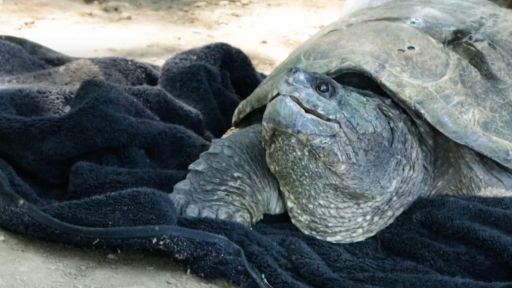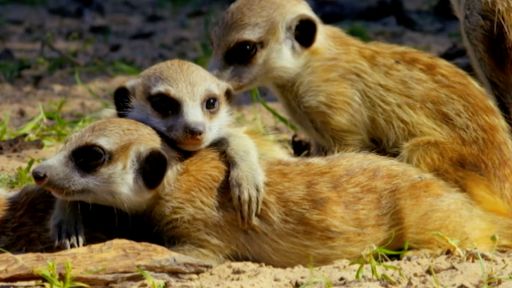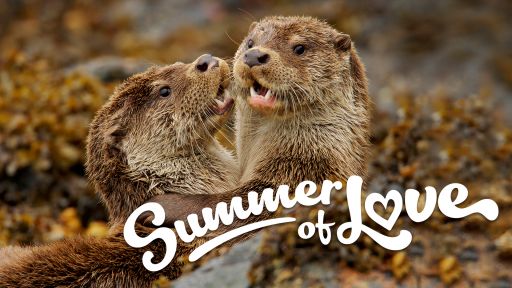The landmark series returns with new documentaries about cats, dogs, squirrels, horses, Vikings, volcanoes and more, culminating in a live three-part special.
NATURE’s new season began October 24th with Super Cats, A Nature Miniseries and continues until May 2019 with exciting new episodes providing an awe-inspiring look into the lives of a diverse group of wildlife. Catch a sneak peek of Super Cats and some other upcoming films in the season preview above. Descriptions of each episode are below.
Super Cats, A Nature Miniseries (three-part series) | Wednesdays, Oct. 24-Nov. 7
Stalking in the shadows, prowling almost every continent, cats are among the world’s most diverse and successful predators. But there is far more to these charismatic and misunderstood animals. Filmed over 600 days in 14 countries and featuring 31 species of cat, this groundbreaking three-part miniseries narrated by F. Murray Abraham uncovers the secret lives of big cats and introduces behaviors captured on film for the first time, using the latest camera technology and scientific research. From the solitary bachelor snow leopard in the Himalayas to the very elusive swamp tiger of South Asia, to the tiny but deadly black-footed cat in South Africa, Nature brings these animal superstars out of the shadows.
A Squirrel’s Guide to Success | Wednesday, Nov. 14
The squirrel family, from tiny chipmunks to big prairie dogs, is one of the most widespread on Earth. There are almost 300 species of squirrels that can glide through the air, outwit rattlesnakes, and survive the coldest temperatures of any mammal. So what is the secret to their success? Uncover the extraordinary abilities of these cheeky nut lovers as a filmmaker puts their problem-solving to the test on a specially designed obstacle course. Join some of the world’s top squirrel scientists who are making groundbreaking discoveries – from the brainy fox squirrel who can remember the location of 9,000 nuts, to the acrobatic gray squirrel whose tree-top leaps are the basis of new designs in robotics. And see the world through the eyes of an orphan red squirrel called Billy, as he grows up and develops all the skills he will need to be released back to the wild.
Dogs in the Land of Lions | Wednesday, Nov. 21
Filmed over two years by cinematographer Kim Wolhuter (Nature: The Cheetah Children), Nature: Dogs in the Land of Lions takes viewers into the heart of an African wild dog family. When lions kill her mate, a wild dog mother called Puzzles suddenly must raise two generations of pups all on her own without the help of a pack. Witness the loyalty and selflessness that sets wild dogs apart from other large, social carnivores in this deeply intimate portrayal of motherhood. But in this unforgiving Zimbabwe wilderness, it turns out the top dogs are the big cats. Lions are the wild dogs’ ultimate enemies. The young dogs provide some light-hearted moments while discovering the world around them, but as they grow up, they must face these eternal enemies on their journey to independence.
Snow Bears | Wednesday, Nov. 28
Set against the harsh backdrop of the Arctic, Nature: Snow Bears is a dramatized story based on the extraordinary adventures and life-changing journey of newborn polar bear cubs as they leave the safety of their den for the first time. Bravely led by their mother, the cubs must make the perilous 400-mile voyage to the sea to feed. Encountering many dangers and adventures along the way — marauding male bears ready to kill, extreme weather, Arctic foxes, Walruses, Narwhal whales, snowdrifts and ice cracks — they undertake an epic survival challenge. These cubs are rarely seen in their natural habitat, and this is a unique glimpse into their world. Kate Winslet narrates.
Attenborough and the Sea Dragon | Wednesday, Jan. 9
A remarkable chance discovery is about to reveal secrets that have laid hidden for 200 million years. A super predator that ruled the ocean at the time of the dinosaurs was found in a crumbling cliff face. It’s an Ichthyosaur, a fish lizard. Older than dinosaurs, these fearsome predators had the very best characteristics of reptiles and mammals in one formidable package. They could regulate their own body temperature, had astonishingly acute eyesight, and combined speed, sensitive “prey-detecting” organs and an impressive set of teeth to hunt successfully. Sir David Attenborough hosts this detective story, from the challenging onsite extraction of the fossils to the 3D reconstruction of the creature. He looks at evidence from animals across the world to try and piece together how this “sea dragon” lived.
Equus: Story of the Horse (two-part series) | Wednesdays, January 16-23
The relationship between man and his noble steed is almost as old as civilization itself, allowing our species to explore, conquer and flourish side by side with the horse. Nature traces this revolutionizing partnership with anthropologist Niobe Thompson, who treks around the world in search of the moment when man first climbed into the saddle and explains how the relationship between humans and horses has evolved in today’s modern world. Discover the habits of these majestic animals and their unique biological makeup, which made them a perfect fit for our ancestors. Ride along with the world’s last nomadic tribes, who view the horse not just as an animal, but a means of survival. Witness the return of horses to the wild as mankind preserves the hardest-working animal partners we’ve ever had. Locations in this two-part series include Mongolia, Montana, Kentucky, Saudi Arabia, Canada, Siberia, and Sable Island, Nova Scotia.
Wild Way of the Vikings | Wednesday, February 13
Experience the natural world through the eyes of the Vikings, when nature meets history in a journey showcasing the wildlife of the North Atlantic. Combining blue-chip natural history filmmaking and dramatic recreations, Nature travels from Norway to Newfoundland, just as the seafaring warriors did in 1,000 A.D., to get a glimpse of the Vikings’ world in the Americas hundreds of years before Columbus. Experience the deep history and cultural respect the Vikings had with the land and sea: from the killer whales of the North Sea to the puffins and otters of the Scottish coast to the volcanic mounts of Iceland and the frozen tundra of Greenland. Go back to the age where Vikings ruled the northern seas; when their only compass was the birds in the sky and the whales pushing through the icy waters. Ewan McGregor narrates.
Living Volcanos | Wednesday, February 20
Volcanoes are the portal to the earth’s fiery magma heart; one might imagine that life above ground would avoid living nearby. But a surprising number of animals survive and thrive alongside them. Right now, in any 24-hour period, some 30 volcanoes are erupting on our planet. This film will uncover the varied activity – both human and natural – that occurs on the slopes of active volcanoes. All life on Earth owes itself to their existence. Volcanos create the land we live on, emit gas that forms the air we breathe, spew minerals from the center of the Earth and make homes for spectacular natural history – they are the source of life.
The Incredible Egg with David Attenborough | Wednesday, April 10
The egg is perhaps nature’s most perfect life support system. These remarkable structures nurture new life; protecting it from the outside world at the same time as allowing it to breathe. They are strong enough to withstand the full weight of an incubating parent and weak enough for a hatchling to break free. But how is an egg made? Why are they the shape they are? And perhaps most importantly, why lay an egg at all? Step by step as the egg hatches, host David Attenborough reveals the wonder behind these incredible miracles of nature.
American Spring LIVE (three-part LIVE event) | April 29 – May 1, 2019
It is one of nature’s greatest performances. Spring is a symphony in green, a time of renewed energy, an awakening. For both plants and animals, age-old survival strategies are on full display at this time of year, and intimate relationships are laid bare. The transformations wrought by this season can be sudden and dramatic – epic migrations culminate in dazzling displays. Or they can be intimate and barely perceptible – like the seduction of a bumblebee by a blossom. American Spring LIVE will be an unprecedented Nature event, broadcast over three consecutive days from iconic locations across North America – varied ecosystems ranging from the Rockies to the Everglades, from inner-city parks to remote wilderness preserves. A diverse group of researchers and citizen scientists will investigate in real time how a wide range of organisms respond to the change of seasons. They will share their insights into the natural world and reveal new technologies that make their discoveries possible. A strong social media component will encourage the audience to participate in the event on a second screen, inspiring them to join in the adventure of science.








